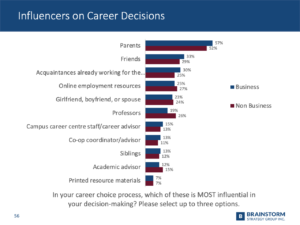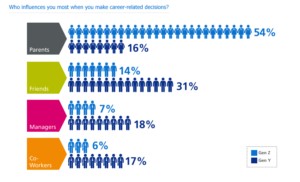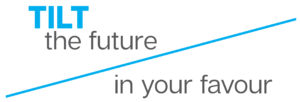
16 Feb Who is Gen Z’s top career influencer?
Choose how you engage with this interview:
- Listen to the podcast TILT the Future with highlights
- Read the full transcript here
- Read the CERIC article here – 3 tips to help parents become (better) informed career influencers
Learn:
- The results of 2 surveys show Generation Z has a different main influencer for their career journeys
- 3 strategies that parents can leverage to tilt them towards offering current & pertinent Future of Work advice
- Access a few resources to create a growth mindset and to start discussions
- How a simple mindset shift can position parents as partners in this life-long career journey with their young adult
How can you interact with this information?
Make. Take. Talk.
This younger generation is seeking out advice.
Make – the effort to understand the more current impacts of new technologies on career prospects
Take – the time to engage in growth mindset discussions and use the resources listed below
Talk – use empowering and open questions when talking to teens, face to face preferably
Full transcript
Host on mic with Karena de Souza
[00:00] Can you imagine who Gen Z’s top career influencer is?
It isn’t their peers or their professors.
It turns out to be …. drum roll … their parents!
[00:12] That is the result in 2 recent surveys in North America.
Survey results
One was the Brainstorm strategy survey. Done in 2019, it questioned around 25,000 Canadian post-secondary (university & college) students. It showed over half the students listed their parents as a primary influence in their decision-making process when talking about careers.
The other was a survey undertaken by Randstadt in conjuction with Future Workforce, which showed the difference in thoughts between Millennials and GenZ when asked the same question. The switch is significant. Whereas Millennials used to look to peers or alumni working at the organizations they were considering, more young adults today are seeking that advice from their parents or an adult that plays that role in their life.
As we talk about the specific transition that is happening with the Future of Work, this proves to be a very interesting statistic – and one that gives us a new opportunity to offer good advice to students making momentous life decisions.
Young adults
Most young adults today have their fingers on the rapid pulse of technology. They understand the impact of technology such as AI and robotics on the automation that is happening. They understand how this will impact their longer-term career plans and influence their jobs.
[01:10] An informed parent can support their student to be flexible and responsive to changes in the future.
But a parent who does not see the ripple effect of new technologies can derail or obstruct a sound career plan.
The right questions …
The best way to react to this new statistic is to put the right information in the hands of the parents so that they can help their young adults.
And it is to equip Generation Z with a great set of questions and arguments so that they can engage in productive discussions with the adults in their lives.
It has never been too early to engage in discussions on careers – any kid who has played dress-up as an astronaut, teacher or fireman will know that.
3 strategies that tilt parents into effective partners
Here are 3 strategies that families can use as they discuss the future, the technologies that are driving change and the possible changes to the nature of work in that future.
[02:10] The first is obviously to be better informed.
1. Better informed is better prepared.
Adults who are beginning to see the ripple impact of these new technologies and better uses of existing technologies on the very nature of work will have a broader view of the available options.
They may expose GenZ to the wonders of coding or robotics – skills that will be the shorthand typing and auto-shop fundamentals for this new generation – a way to understand what is under the hood.
We can still talk about traditional career streams. But look at ways that surgeons are gaining better precision and productivity by augmenting their work with robots, or how lawyers can drill through to the most pertinent cases with the help of AI tools. In these discussions, we talk about embracing and blending technology into our career planning – just as we are embracing Siri in helping our own daily tasks and workflow as we use it to launch a soothing playlist or settle an argument on who won the Superbowl in 2015.
A great way of blending tech with home could be to listen to a Future of Work TEDx talk together on your Alexa or on Google while car-pooling.
Some resources to use:
- TEDx talks on the Future of Work and videos that prepare parents
- Podcasts such as Tilt the Future & Harvard Business Review ‘Managing the Future of Work’
- edX free online classes such as ‘Shaping Work of the Future’
- World Economic Forum discussions on the skills needed in the Future of Work
2. Create a growth mindset with conversations that empower
[03:27] The next is to elevate the human in our relationships. As technologies make it easier for us to turn voice to text or action, let us make sure that it is not only the emojis that smile in our conversations.
Machines will quickly develop to take over all the mundane tasks that interrupt our day. This is supposed to leave more time for humans to be human. And that practice starts at home – with face-to-face conversations.
As we do this, use empowering and open language that supports a growth mindset. Critical thinking evolves as we push at the boundaries of what we think is possible.
Play at What If. Discuss the various issues that engage and impact our families in a particular way. Is it the urgent focus on climate action, persistent respect for education as a social equalizer, improved living conditions or a passion for space travel?
What new technology would have to be developed or old social structure disrupted for your issue or solution to see the light of day?
Some resources:
- Create discussions using open-ended questions:
- What problem do you seek to solve?
- What issues really bother you?
- What does success mean to you?
- Use these tools to start conversations: UN Sustainability goals and MySparkPath challenge cards
There is growing evidence that our positive and negative experiences in our youth significantly inform the projects that engage our attention as we move through life. The more passionate environmentalists are those that made mud pies or counted the birds in their backyard. Robotics enthusiasts are the same kids who pulled apart every chair and dismantled the remote.
3. Don’t always parent as you were parented
[05:06] The last strategy is aimed more at parents – parents who get caught up in the daily rhythm of life, and despite themselves default to the safety of “parenting as they were parented”. As with most areas of our lives, all it takes is a little conversation between friends, a nudge that things may no longer be as they once were, for us to lift our chin, evaluate the horizon and set a new course for our family.
Families as the foundation for EQ skills
As a parent, I was pleased to see that there are a number of students out there who seek their parents as career influencers, and include their wisdom as they make the longer term decisions in life.
I am hoping more young adults see that their parents are staying involved in the trends. It is encouraging to see students seek out the life lessons that are the building block of the precious EQ skills from their parents. That they are learning resilience, critical thinking, planning and communication.
Ultimately, I am thrilled that we are seeing families creating a tighter bond as they face this exciting but uncertain future together.
There is an exception to this rule of not parenting as you were parented:
Family stories of grit, resilience and critical thinking show today’s teen that some life situations will repeat over history – and that their parents, grandparents and ancestors were able to handle these with the least amount of schooling, but with the education & EQ skills discovered in the school of hard knocks. These stories create the self-confidence and communication skills that are crucial for success in the new Future of Work.
Parents remain a constant influencer
By incorporating these simple strategies, parents can model these perspectives and skills to their children:
- Embrace change as a new constant
- Always be researching and learning
- A long-term perspective allows us to see different options
- Conversations and personal connections matter as we go increasingly digital
Any of these simple mindset shifts can leverage the position of parents as powerful partners along their young adult’s career journey.
I will always believe that we can make changes to our future by making small incremental changes – and thus Tilt the Future in our favour.
Karena de Souza hosts the podcast Tilt the Future, discussing the opportunities and challenges of the Future of Work from GenZ-60. Find your favourite episode wherever you stream your audio. Follow and share the podcast if you like it. Visit the website tiltthefuture.com to explore the workshops, presentations & communities that discuss this topic.





No Comments